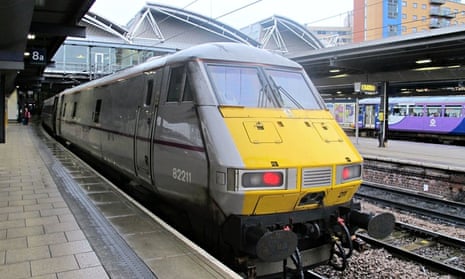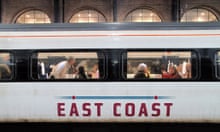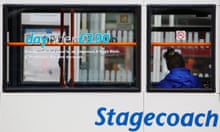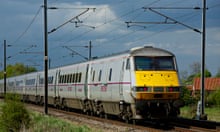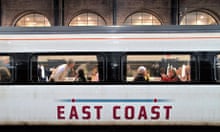No wonder they’re flogging off the publicly owned east coast rail franchise: its very existence is a stubborn rejection of “the market does best” dogma. Public ownership has routinely been caricatured as a wasteful, subsidy-guzzling failure. How infuriating it must be, then, for free-market ideologues that east coast depended on less public subsidies than any of the 15 privately run rail franchises. Indeed, the franchise has proved a lucrative cash cow for the state, bringing in around £1bn to the exchequer since 2009. East coast is an embarrassing success story for public ownership. Instead, it must be run by a tax exile and a Scottish businessman perhaps best known for campaigning against gay equality.
The disaster of railway privatisation is an Achilles’s heel for free-market ideologues, and they know it all too well. Handing east coast to Stagecoach and Virgin represents an “up yours” to British public opinion, which despairs of our fragmented, inefficient, rip-off rail network. According to a YouGov poll last year, two-thirds of us believe railway companies should be run in the public sector, with less than a quarter opting for privatisation. Not just Labour supporters, either: more than half of Tory voters opted for public ownership, and Ukip voters were actually more likely to support a nationalised network than the rest of the population. The government’s dogma could hardly be more divorced from the pragmatic commonsense of the British people.
Support for rail privatisation is a fringe opinion for so many reasons. We spend far more on subsidies on our privatised rail network than we did in the days of British Rail. According to a 2013 report, nearly £3bn was splashed out on the five most expensive rail companies between 2007 and 2011 alone. Technological innovation and improved infrastructure were financed or underwritten by the state. The changing nature of our economy and society has compelled more and more of us to travel by rail, but the failure to replace rolling stock adequately has left us ever more crammed together in overcrowded carriages. For the privilege of being pressed into the armpit of another commuter, English passengers pay more for rail tickets than anywhere else in Europe. It can be cheaper to fly to foreign climes than to travel by rail in our own country.
Just as perversely, the government does allow state ownership of rail – just as long as it is any state but Britain. In his recent book Private Island, James Meek highlighted the absurdity of the likes of the German and French state de facto running largely swaths of our utilities. “We have not successfully rolled back the frontiers of the state in Britain, only to see them reimposed at a European level,” Margaret Thatcher once infamously declared. What an irony that the dogma she preached has meant just that.
No wonder public ownership of rail is so overwhelmingly popular. What a tragedy that Labour is currently offering a confused mishmash of a policy that will satisfy nobody: allowing the public sector to compete for rail franchises. It would be far more popular – and clearer – to simply commit to bringing every rail company into public hands as each franchise expires. An integrated, publicly run railway could be built. Rather than a return to top-down control by bureaucrats in Whitehall, passengers and workers could be involved in running the industry.
But east coast has embarrassed the government with its success for far too long. In the name of neo-liberal dogma, the railway must instead be a rip-off, fragmented mess. Private rail companies will continue to leech off the public purse. It is all too emblematic of a society that puts profits before people. The hope must surely be that this dogma has finally overreached itself.
